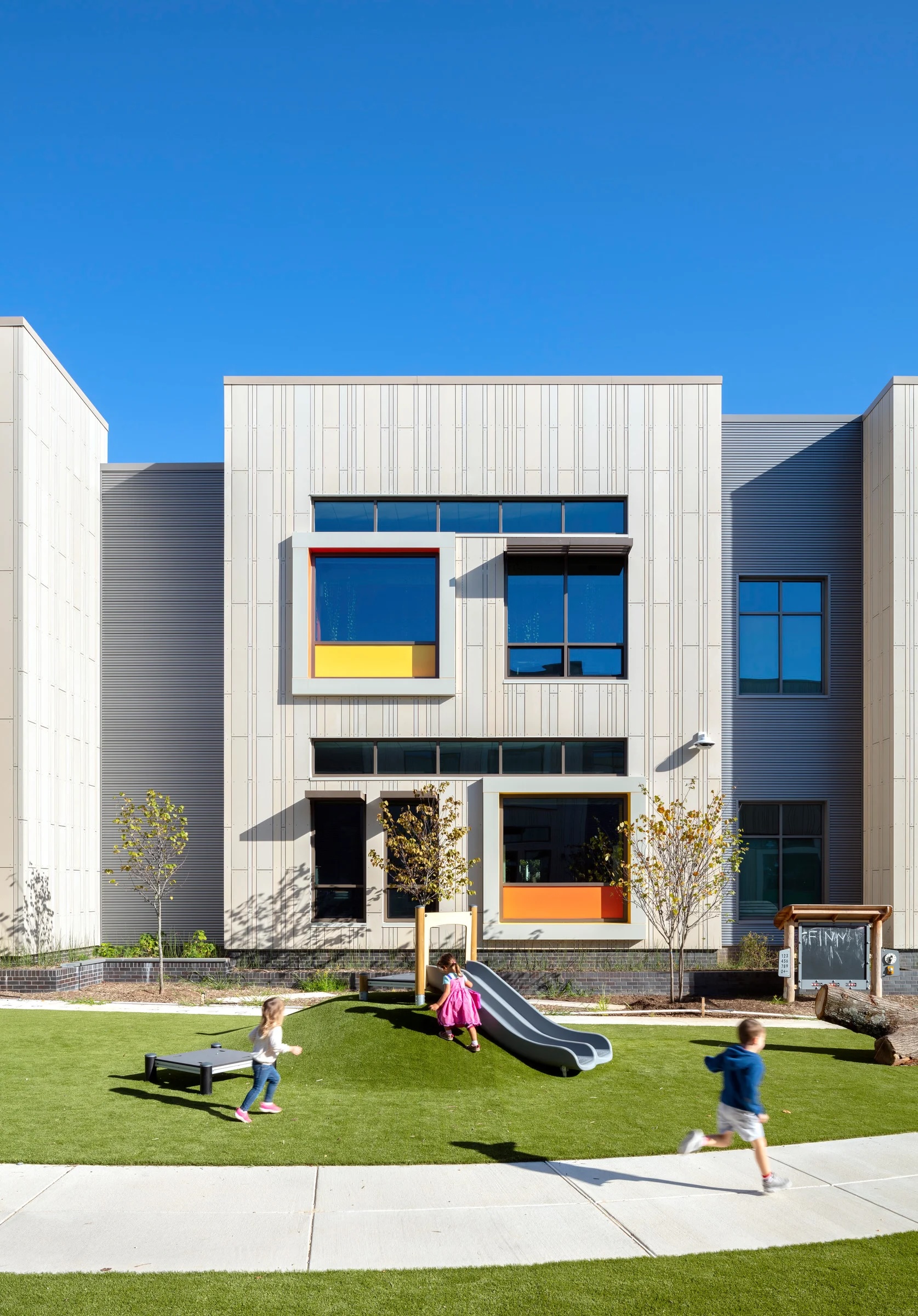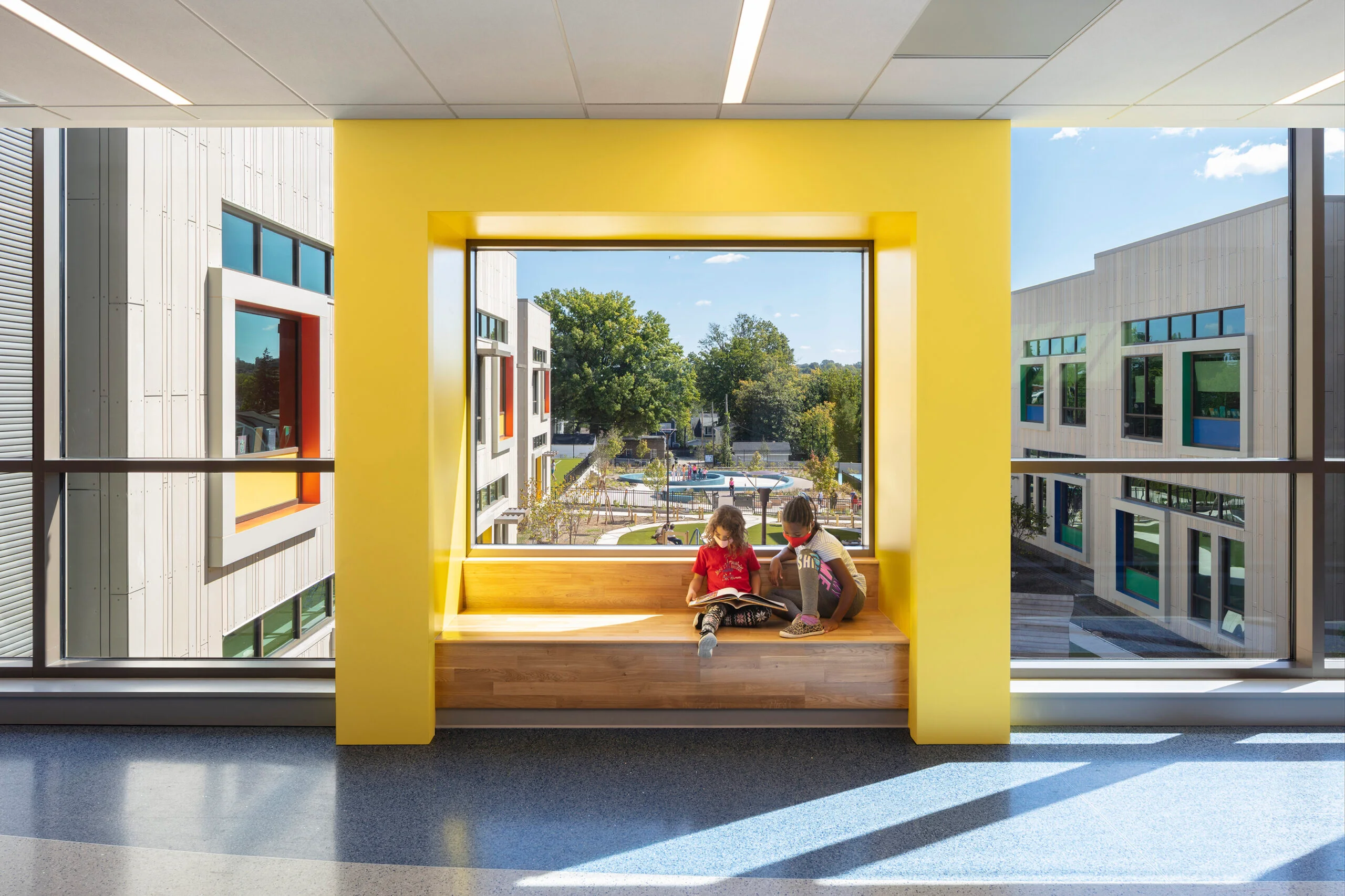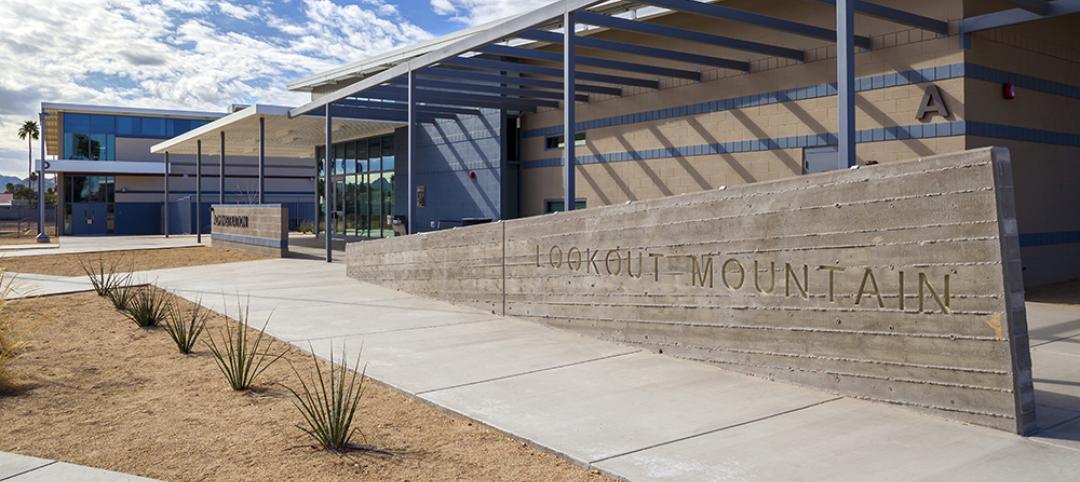A new K-12 school in Washington, D.C., is the first school in the world to achieve both LEED for Schools Platinum and WELL Platinum, according to its architect, Perkins Eastman.
The John Lewis Elementary School is also the first school in the District of Columbia designed to achieve net-zero energy (NZE). The facility was designed to improve student and teacher performance, health, and well-being, as well as reduce the building’s life-cycle costs. (See more K-12 schools coverage from BD+C.)
The new building replaced an obsolete, brutalist open-plan building. The design retained the best aspects of the open plan, providing flexible space and ease of communication, while improving adjacencies, daylighting, acoustics, security, and outdoor space.
The design emphasizes outdoor recreation and connections with the natural world, known to improve student health and academic achievement. The landscape design embeds natural systems with dynamic play and learning spaces to blur the walls of the classroom. A treasured place for the community, certain school amenities are accessible after-hours and on weekends.
The building offers a series of intimate, child-scaled houses inside and outside that foster collaboration and strong relationships. Designers benchmarked performance against several of the highest performing schools in the country on energy and Indoor Environmental Quality (IEQ) factors to provide the best daylight, most comfortable, and healthiest learning environments of any school building.

A high-performance dashboard tracks the building’s energy consumption, showcases the building’s sustainability features, and links to the school’s curriculum to address topics such as social and environmental justice, climate change, and water conservation. Through this interactive, online dashboard, students and teachers can discover how they interact with the building, and how the building and campus influence and are influenced by the larger environment.
The building is paired with Benjamin Banneker Academic High School, concurrently designed, which is also targeting NZE. The excess energy expected to be generated at John Lewis will help Banneker also achieve NZE.
Owner and/or developer: DC Department of General Services | DCPS
Architect: Perkins Eastman DC
MEP engineer: CMTA
Structural engineer: Yun Associates
General contractor/construction manager: MCN Build
Related Stories
| Aug 5, 2014
K-12 School Sector Giants: Pent-up demand finally produces movement in schools market [2014 Giants 300 Report]
After a long period of anemic performance, with growth mostly driven by renovations and additions, the K-12 sector is showing renewed interest in new construction, according to BD+C's 2014 Giants 300 Report.
| Jul 28, 2014
Reconstruction market benefits from improving economy, new technology [2014 Giants 300 Report]
Following years of fairly lackluster demand for commercial property remodeling, reconstruction revenue is improving, according to the 2014 Giants 300 report.
| Jul 28, 2014
Reconstruction Sector Construction Firms [2014 Giants 300 Report]
Structure Tone, Turner, and Gilbane top Building Design+Construction's 2014 ranking of the largest reconstruction contractor and construction management firms in the U.S.
| Jul 28, 2014
Reconstruction Sector Engineering Firms [2014 Giants 300 Report]
Jacobs, URS, and Wiss, Janney, Elstner top Building Design+Construction's 2014 ranking of the largest reconstruction engineering and engineering/architecture firms in the U.S.
| Jul 28, 2014
Reconstruction Sector Architecture Firms [2014 Giants 300 Report]
Stantec, HDR, and HOK top Building Design+Construction's 2014 ranking of the largest reconstruction architecture and architecture/engineering firms in the U.S.
| Jul 23, 2014
Architecture Billings Index up nearly a point in June
AIA reported the June ABI score was 53.5, up from a mark of 52.6 in May.
| Jul 21, 2014
Economists ponder uneven recovery, weigh benefits of big infrastructure [2014 Giants 300 Report]
According to expert forecasters, multifamily projects, the Panama Canal expansion, and the petroleum industry’s “shale gale” could be saving graces for commercial AEC firms seeking growth opportunities in an economy that’s provided its share of recent disappointments.
| Jul 18, 2014
Contractors warm up to new technologies, invent new management schemes [2014 Giants 300 Report]
“UAV.” “LATISTA.” “CMST.” If BD+C Giants 300 contractors have anything to say about it, these new terms may someday be as well known as “BIM” or “LEED.” Here’s a sampling of what Giant GCs and CMs are doing by way of technological and managerial innovation.
| Jul 18, 2014
Top Construction Management Firms [2014 Giants 300 Report]
Jacobs, Barton Malow, Hill International top Building Design+Construction's 2014 ranking of the largest construction management and project management firms in the United States.
| Jul 18, 2014
Top Contractors [2014 Giants 300 Report]
Turner, Whiting-Turner, Skanska top Building Design+Construction's 2014 ranking of the largest contractors in the United States.














